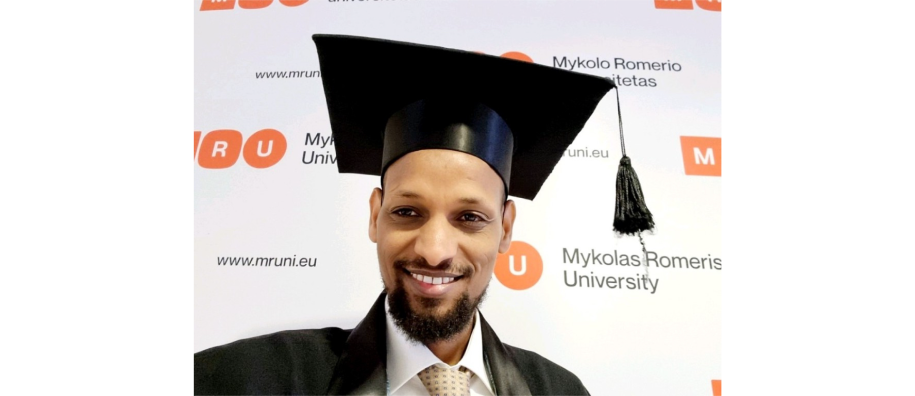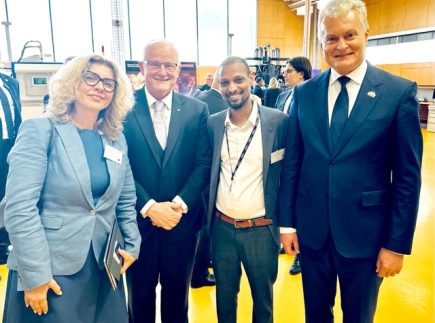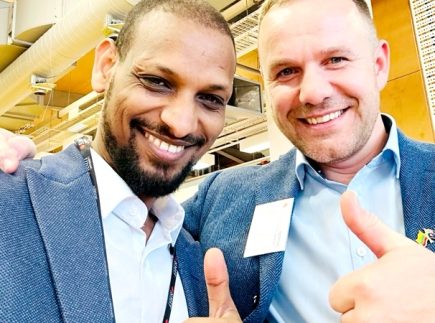
Desta G. is an alumnus of Mykolas Romeris University and he is currently actively contributing to cyber security research and continuing his academic journey by studying for a PhD at RMIT University (RMIT University Melbourne City Campus in Australia). In 2022, the Cyber Security Research and Innovation Centre of RMIT University and the MRU Faculty of Public Management and Business agreed to cooperate and expand their mutual relations in the field of cyber security by launching the Australia-Lithuania Cyber Research Collaboration Platform and the Australia-Lithuania Cyber Research Network (ALCRN) and the Australia-Lithuania Hybrid Threat Centre.
In October, RMIT University hosted a meeting of the Lithuanian-Australian Cyber Research Network to discuss cybersecurity. Despite the many well-known faces - the President of Lithuania, the heads of the top 7 Lithuanian scientific institutions, we were happy to see a graduate of Mykolas Romeris University, a cyber security specialist - you.
What do you see as the biggest advantages of this event?
The most significant advantages of the meeting are consolidating the bilateral relations and fostering cooperation between the two universities and the countries at large. The attendees, academic delegates, and government officials of both countries reaffirmed their commitment to the success of the Australian Lithuanian Cyber Research Network (ALCRN) projects. The ALCRN projects are designed to share experiences and spread knowledge in preventing and mitigating cyber threats.
RMIT university in Australia actively cooperates with Mykolas Romeris university in terms of cybersurity. What is the significance of collaboration between RMIT and MRU?
The two universities work closely in cybersecurity and related fields. They jointly opened the Australian Lithuanian Cyber Research Network (ALCRN). As we know, Lithuania has a good stand in cybersecurity and networking. In return, Australia is technologically and economically advanced and has a high demand to foster cybersecurity. The demand for cybersecurity in Australia brings an opportunity to work collaboratively on cyber-related projects like ALCRN. As a principal technology university, RMIT University is taking the lead in cybersecurity research and innovation. It has established an international award-winning center for cyber security research and innovation, where I am currently working as a cyber security research assistant and subject matter expert. Mykolas Romeris University is also working hard in the cybersecurity and fine-tech areas. The university has become an academic partner with RMIT University, mainly with its cybersecurity management master's program. The program is serving as a link for international partnerships in cybersecurity. Therefore, the significance of this collaboration between MRU and RMIT University can be summarized as knowledge and experience sharing, innovation, resource and financial support in assisting cybersecurity projects, internationalization and market opportunity, and much more.
You are a cyber security expert. Could you name your greatest achievement in cybersecurity research?
As a recent cybersecurity graduate (master's) and a current Ph.D. student, I have immersed myself in research and innovation. I have researched topics related to cybersecurity, cybersecurity culture, cybersecurity policy, cyber resilience, and cybersecurity investigations during my master's and PhD studies. When I decided to join cybersecurity, it was not just because of a passion. It was because I had a goal and a gap to fill. There is a gap in settling cyber conflicts, unlike when we apply diplomatic efforts in real socio-political conflicts. Therefore, I dream of significantly contributing to building solid cyber diplomacy. So far, the United Nations Disarmament Office has certified me in cyberdiplomacy. Besides my Ph.D., I am also studying diplomacy and international relations to link cybersecurity with diplomacy. As future businesses are heading to complete digital transformation and cyberspace, cyber diplomacy will play a vital role in resolving cyber-related issues. In my current role at RMIT University, I am a cyber security research assistant and subject matter expert at the RMIT Centre for Cyber Security Research and Innovation. As I mentioned earlier, the center is an international award-winning center. Being part of the contributing backbones of the center's achievement is a pride and honor. I am developing content used as policy input and teaching materials nationally and internationally for governments, universities, business organizations, and industries.
How would you recommend raising awareness among the general public about the importance of cyber security and the dangers of cyber threats?
As cybercrime is a transnational crime, it's essential to enhance cybersecurity awareness in broad society. To raise this awareness in a society with a distinguished socio-cultural background and origin, assessing the society's attitudes, knowledge, assumptions, norms, and values and their connection to cybersecurity awareness is recommended. From that point, we can apply a customized approach to training, workshops, leadership, policies, and procedures. We also have to consider language barriers and resource limitations. Translating awareness-enhancing content into local language can help people as they can understand it better with their language. However, the most important thing is that a cybersecurity awareness enhancement program should have continuous and business-incorporated training.
Finally, we have a question for you as an MRU graduate. What was the most valuable lesson you learnt during your Master's studies at MRU?
All the lessons I had during my master's study are valuable. I enjoyed them all. The program is well-designed, and the course materials are developed to be convenient for teaching. But if I had to choose my favorite lessons, I would mention courses such as privacy and data protection, security economics, the legal environment of cybersecurity, and modeling of electronic information security.

